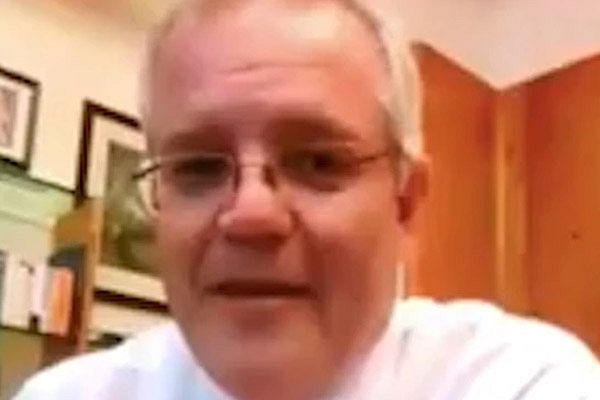While the Morrison Government is optimistic about economic recovery after COVID-19, economists don't share their positivity, writes Dr Binoy Kampmark.
FEW WORDS ARE as ugly as the term “economic snapback”. They suggest a convulsive return to form, a shock awakening after a period of hibernation. It is with such words that huge stimulus and job retention packages have been designed and deployed, with what will prove to be mixed degrees of success. And there, we have the problem.
The chief placard holder for snapback economics has been Prime Minister Scott Morrison.
In a televised prayer session on 23 March, he looked to the heavens for the restoration of full streets, with re-opened businesses:
“Australians going about their lives again, returning to their jobs, returning to their livelihoods, returning to normal times in our schools so children can learn and that we can get to the other side of this.”
Both are cognates: the idea of snapping back to pre-COVID-19 normality is a journey to “the other side” undertaken with some trauma but, ultimately, success.
In recent days, the Morrison Government has had some reason to feel, if not confident, then some mild reassurance that the calamity peeking on the other side of the coronavirus highway is not entirely apocalyptic. The Reserve Bank of Australia has furnished a two-year forecast on jobs, wages and growth, with unemployment rising to 10%.
But this pessimistic assessment comes with nuggets of confidence. There are suggestions that a healthier ‘economic recovery would be possible if further gains in controlling the virus were achieved in the near term and most containment measures were phased out over the coming months’. Economic activity might shrink by more than 8% in the June quarter but canter back to 7% the following year. Much the same is said about that biggest of drivers of economic growth: consumer spending.
Such qualified optimism does not impress economist Peter Martin, who fears that the relevant baseline forecasts ‘aren’t frightening enough’, being built upon ‘a return to form for household spending, which accounts for 65% of gross domestic product’. Any predictions of a V-shaped recovery would look ‘more like a flat-bottomed boat when graphed’. Forget any thoughts of “snapback”.
The snapback notion leaves us with the impression of imminent, romantic return, a form of historical restitution to a point where we were before the shock. This is touching, if totally delusionary.
Like Martin, Senior Fairfax economics correspondent Shane Wright is not one to fall for it:
‘This isn’t about working from home or the big increase in online shopping or how parents have a new appreciation for what school teachers endure five days a week. This is about jobs and businesses that will disappear forever.’
Ian Verrender, Business Editor at the ABC, makes the similar, if self-evident point:
‘It’s now becoming clear that even if we do get back some semblance of normality, whatever what may be, it will be much longer climb back than our leaders are willing to concede.’
This harsh but eminently realistic position was seemingly adopted by Shadow Climate Change Minister Mark Butler, who aired his views on that most government-friendly of stations, Sky News:
“Any idea that the economy is going to be able to snap back magically in a few months’ time to the position it found itself in before the coronavirus is frankly a fantasy.”
Morrison, argued Butler, should don the clothes of leadership “and not pretend that the economy is going to be able to snap back and people are going to be able to go back to the way we were”.
Butler’s views seemed sensible, but he had not noticed his own leader’s movements on the issue.
Being tempted by and unfortunately adopting the same language as Morrison in his latest “vision statement”, Labor leader Anthony Albanese has been doing his bit to improve snapback shoddiness:
“Let’s not SnapBack to insecure work, to job seekers stuck in poverty, to scientists being ignored.”
In doing so, there is a nice bit of self-defeating terminology: how do you return, or snapback, to what was not the case before?
This inconsistency does not trouble the opposition leader:
“It’s no time for ‘SnapBack’ to the Liberal agenda of cutting services, suppressing wages and undermining job security.”
He hopes that ‘a more resilient society’ will be the outcome of the crisis.
These are the sorts of speeches to inspire confusion and despair. But a few crumbs of direction are offered as to what this world will look like. The resilient society will involve recognising “the contributions of unsung heroes like our cleaners, supermarket workers and delivery workers”. Health and aged care workers will also find their way into the resilient society pantheon, as will young people who “have done more than their share”.
A post-coronavirus Australia would have to ensure that what subsequently grew would be a “society that no longer seems stacked against them, or denies them the opportunity and economic security of older generations”.
Morrison arguably qualified his lofty ideas of an economy of snapping return with his government’s refusal to expand the JobKeeper program, compromising wage subsidies totalling up to $1,500 a fortnight. Casuals up to a million in number and foreign workers on temporary visas, numbering some 2.2 million, failed to feature. The money and resources to cover these unfortunates, he claimed, were not “finite”.
Such attitudes give us a clue that the other side will not look like an Eden returned but a post-idyll ravaged. There will not be a grand restoration so much as a bandaged patient in convalescence, remaining sickly for a good time to come.
Dr Binoy Kampmark was a Cambridge Scholar and is an Independent Australia columnist and lecturer at RMIT University. You can follow Dr Kampmark on Twitter @BKampmark.
 This work is licensed under a Creative Commons Attribution-NonCommercial-NoDerivs 3.0 Australia License
This work is licensed under a Creative Commons Attribution-NonCommercial-NoDerivs 3.0 Australia License
Support independent journalism Subscribe to IA.












